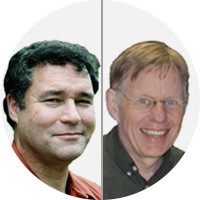The views expressed in our content reflect individual perspectives and do not represent the authoritative views of the Baha'i Faith.
Perhaps the most common misconception that scientists have about religion is that it requires a belief in the physical existence of God. The scientist hears, or believes that she hears, something like the following from a person of faith: “creation is incomplete without God. God is logically required for the world to exist, for the miracle of life to have occurred, and for religious phenomena to take place. Religious authority ultimately derives from obedience to an all-powerful God. Any discussion about religion is ultimately a discussion about God.”
This mistaken belief, supported by the various “proofs” of God’s existence offered from the Middle Ages to the present, has made dialogue difficult. Examples of these “proofs” include:
“Every action must have a cause, therefore God must be the first cause”,
“The universe is too wonderful for it not to have a creator”,
“The universe was literally created as described in Genesis”, and so forth.
Many scientists have examined the material meaning of each of these so-called proofs, according to the standards of science, and found them wanting. Then, following the rule of the weakest link, they have rejected religion. This tendency will only increase in the future as science advances to explore the first milliseconds of the universe, clone and otherwise come closer to creating life, understand human consciousness as a series of biochemical reactions inside the brain, electronically stimulate quasi-religious experiences, use computer models to explain the evolutionary benefit of compassion, altruism, and other proto-religious traits, and so forth.
What causes this apparent predicament for people of faith? How do they respond to the “de-mythologizing” of past religious practice and belief? Most fundamentally, the superstitious aspects of many of our assumptions about religion are being stripped away. What should our response be?
First of all, and most particularly, we know nothing about God — nothing whatsoever.
We will never be able to prove, using either the material or logical means required by science, that God exists. How could we? How could an all-powerful Creator be something that we are at all wise enough to understand or describe? There is no materially testable, scientific hypothesis here. We can never see God, hear God, feel God or touch God in any way that the scientist accepts.
The Baha’i teachings say:
To every discerning and illuminated heart it is evident that God, the unknowable Essence, the Divine Being, is immensely exalted beyond every human attribute, such as corporeal existence, ascent and descent, egress and regress. Far be it from His glory that human tongue should adequately recount His praise, or that human heart comprehend His fathomless mystery. He is, and hath ever been, veiled in the ancient eternity of His Essence, and will remain in His Reality everlastingly hidden from the sight of men. – Gleanings from the Writings of Baha’u’llah, p. 46.
Nor could philosophy prove, using logical arguments, that God exists. To say that something exists is to contain it and define it. A God whose existence can be logically proven is not essentially different from a God that can be seen, and whatever God “is” (or is not) must, by definition, be far more powerful than that.
So it seems as if we’re missing all the logical underpinnings of a dialogue with a scientist about God and spirituality. If religion derives its authority from God, and there is nothing we can scientifically demonstrate or prove about God, on what reasonable basis that a scientist would accept, should she even consider religion?
The Baha’i teachings suggest that the rationally- and scientifically-minded give up the notion that an infinite, incomprehensible and unknowable concept is provable or demonstrable. Consider this: science, mathematics and physics all utilize the idea of infinity. Scientists see infinity as an abstract but very useful concept, readily accepted and even necessary for their basic understanding of their disciplines.
Instead, in the same way we think of infinity, it could be helpful scientifically to suggest that questions surrounding the idea of God are non-testable hypotheses. That is, they are fundamentally outside the purview and provability of science. (Note: a non-testable hypothesis not only means that a hypothesis cannot be proved, but also that it cannot be disproved. No scientist has ever disproved the existence of God.) This clarification should do two things: First, it will turn off the “doubt and disprove” switch inside the scientist’s head. Second, it should turn on an equally strong switch inside the scientist’s head, labeled “curiosity”.
You May Also Like
Comments


















The position depicted by Greg and Jerry seems to this amateur to hinge on one's interpretation of "logic" which in the flexible English language of today takes on several meanings
My hobby horse against atheism is not exactly the same as proving God's existence but it sure comes close in the deductive reasoning penned by Kluge
From the frame of reference of scholars Ian ...Kluge’s erudition in "The New Atheism – A Bahá’í Perspective" comprehensively addresses violation of the principle of sufficient reason (PSR), flaws in ontological and methodological materialism and naturalism, (“Why should we go to the colleges? Let us go to the cow.” 'Abdu'l-Baha Promulgation of Universal Peace p361) in positivism, in postmodernism, and in positing an actual infinite regress vis-à-vis why we need to know (a) the final cause (or belief al la Pascal’s Wager) and (b) how to answer other why questions, nonsensically brushed aside tout court by professor Dawkins, who alone among the new atheists seems even peripherally aware of the PSR and who disingenuously writes in "The God Delusion", while laughing all the way to the bank: “What on Earth is a why question?” and “Some questions simply do not deserve an answer.” Our Bahá’í brother Ian reveals absurdities present in Presentism and Literalism, so often found in Hitchen’s criticism of the Old Testament and the New Testament, and he has kaput-ed Mark Twain’s jest much admired by Dennett in "Breaking The Spell"" : “Faith is believing what you know ain’t so.” By the way, the top 100 books on atheism are well on the way to 1,000.
Evolutionary psychology is the most horrible form of reductionism. Human consciousness is our link to our soul and intellect. If this is reduced to merely chemical impulses in the brain, what is left? This is not desirable to me.
Just as God is essentially unknowable, I think man's essence is equally unknowable by these materialistic methods. Even as He hath said: “Man is My mystery, ...and I am his mystery."
What these now well accepted theorems of Math mean is that Math is limited, and therefore our precise understanding of nature is limited and science is limited. There are many ...phenomena that cannot be explained with a theorem and for which we'll need to content ourselves with some empirical evidence. This is not a religious conclusion it is a scientific one that is well accepted (look up those names if you don't believe me).
So it should come as no surprise to any honest thinker that there is much science cannot explain (we have proven this scientifically!). It is also clear to a fair observer that there is a LOT of human knowledge that transcends scientific understanding. Like our way of organization that is ever advancing, our intuition, the deep wisdom, compassion, love displayed by unique members of the human race throughout history. The transformative power of Faith, love for God, and love for one's neighbor.
In the end, it may be that those who act in ways that transcend animalistic behavior and display Divine qualities like self-effacement, sacrifice, piety, compassion, mercy, trustworthiness, etc.. may be "deluded". But society is much better off because of it. That ancient knowledge didn't come from a materialistic world view but from a religious one. And that "delusion" has done better in putting the basis on what human personal behavior should be than any branch of science has.